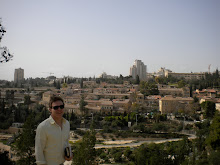
Dr. Paul Wright is not your average professor. The man is a genius, both in regard to his familiarity with the Bible and the city of Jerusalem. He knows a seemingly endless amount of history: describing events with such detail, clarity, and passion, his mind is overflowing with more information than a textbook but his delivery puts textbooks to shame. I do not think that I have heard him say the words "I don't know" and that is most likely because there isn't anything that this man doesn't know. Walking the city with such comfort while he feeds us with such elaborate information it almost seems as if he wrote the book of history, which he did--we're reading for his class. His teaching style can be most clearly depicted by a man dumping a bucket of water over my head while I strive to swallow as much as I can, because man, I'm thirsty for what he has. I knew Jerusalem would change me--I had no idea it would be like this. I did not know it was possible to know this much, and I did not know that one could love Jerusalem or God as much as he does.
While learning about Herod the Great, I was overwhelmed with the idea that certain things never change. Like many men today (Bill Gates, for example), Herod was an ambitious man, who, although full of pride, achieved enormous accomplishments throughout his life that have been remembered for over 2,000 years. Regardless of what else we determined about him, especially in regards to his ego, we must not fail to consider the incredible impact he made in this particular region of the world. Thankfully, we can also remember him by interacting with those who continue to live like him: there is no shortage of men who seem to be under the impression that they rule the world, or even something of value—the only difference is that Herod actually ruled a part of it. Yes, his jurisdiction may have been comparably smaller than Alexander’s or Darius’s, but for what little he had he was quite productive. Most impressive was his ability to please both the Romans and the Jews—for the most part. Although he wasn’t even part Jewish, he was humble enough (or maybe just smart enough) to know when to let the Jews have their way with the Temple while still being able to impress the Roman officials above him, thus bringing glory to the empire.
Though the construction of Herod’s temple is not recorded in any scripture to be ordained by God, Jesus himself regarded it of matching value as the previous temple, referring to it as the house of God (Matthew 21:13). It was such an out-of-body experience to walk the steps that Jesus walked and where Gamaliel (famous Jewish Rabbi) taught Paul and where the apostles would have met during the time of the early church in Acts. This is the site where they added to their number daily (Acts 2)! Christianity owes most of its identity to the initial growth that took place in Jerusalem within the temple. After these experiences, my biggest prayer has been that God would give us all the ability to bring this information back to the United States and teach those who are unable to make it here themselves. This city is full of so much history, but more important are those events that changed history as we know it. In order to fully comprehend much of the Bible, one must understand the physical settings of those who wrote it, for the authors wrote with their own presuppositions and assumptions that the audience would be aware of, but for those removed from Ancient Israel (in both time and place), much of what is assumed is not understood. Christ, my prayer is that you would enable us to tell the world about you and what you have done here, and create within us the same heart for Jerusalem that you have.



No comments:
Post a Comment